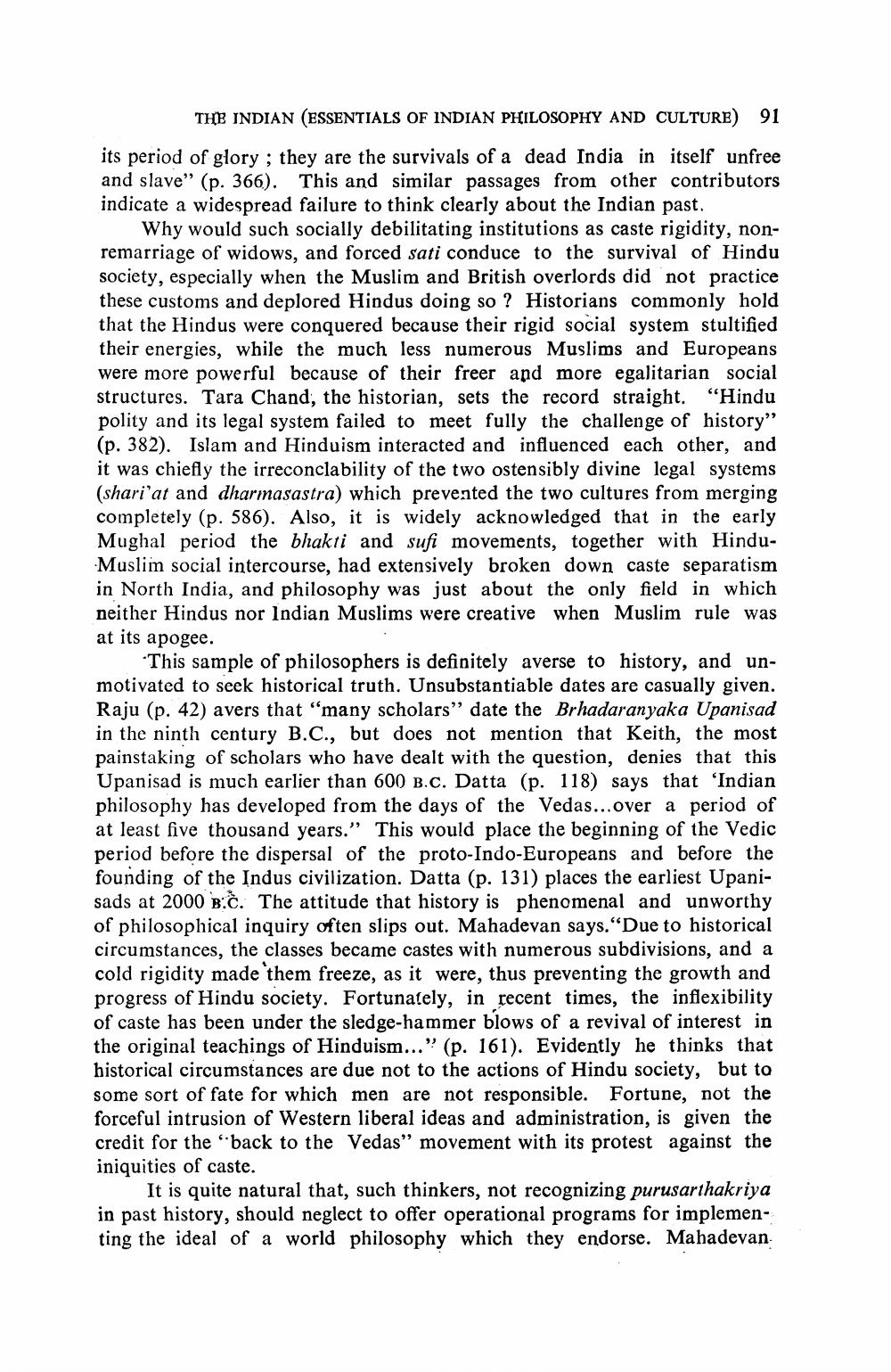Book Title: Indian Mind Essentials Of Indian Philosophy And Culture Author(s): Richard H Robinson Publisher: Richard H Robinson View full book textPage 4
________________ THE INDIAN (ESSENTIALS OF INDIAN PHILOSOPHY AND CULTURE) 91 its period of glory; they are the survivals of a dead India in itself unfree and slave" (p. 366). This and similar passages from other contributors indicate a widespread failure to think clearly about the Indian past. Why would such socially debilitating institutions as caste rigidity, nonremarriage of widows, and forced sati conduce to the survival of Hindu society, especially when the Muslim and British overlords did not practice these customs and deplored Hindus doing so? Historians commonly hold that the Hindus were conquered because their rigid social system stultified their energies, while the much less numerous Muslims and Europeans were more powerful because of their freer and more egalitarian social structures. Tara Chand, the historian, sets the record straight. "Hindu polity and its legal system failed to meet fully the challenge of history" (p. 382). Islam and Hinduism interacted and influenced each other, and it was chiefly the irreconclability of the two ostensibly divine legal systems (shari'at and dharmasastra) which prevented the two cultures from merging completely (p. 586). Also, it is widely acknowledged that in the early Mughal period the bhakti and sufi movements, together with HinduMuslim social intercourse, had extensively broken down caste separatism in North India, and philosophy was just about the only field in which neither Hindus nor Indian Muslims were creative when Muslim rule was at its apogee. This sample of philosophers is definitely averse to history, and unmotivated to seek historical truth. Unsubstantiable dates are casually given. Raju (p. 42) avers that "many scholars" date the Brhadaranyaka Upanisad in the ninth century B.C., but does not mention that Keith, the most painstaking of scholars who have dealt with the question, denies that this Upanisad is much earlier than 600 B.C. Datta (p. 118) says that 'Indian philosophy has developed from the days of the Vedas...over a period of at least five thousand years." This would place the beginning of the Vedic period before the dispersal of the proto-Indo-Europeans and before the founding of the Indus civilization. Datta (p. 131) places the earliest Upanisads at 2000 BC. The attitude that history is phenomenal and unworthy of philosophical inquiry often slips out. Mahadevan says. "Due to historical circumstances, the classes became castes with numerous subdivisions, and a cold rigidity made them freeze, as it were, thus preventing the growth and progress of Hindu society. Fortunately, in recent times, the inflexibility of caste has been under the sledge-hammer blows of a revival of interest in the original teachings of Hinduism..." (p. 161). Evidently he thinks that historical circumstances are due not to the actions of Hindu society, but to some sort of fate for which men are not responsible. Fortune, not the forceful intrusion of Western liberal ideas and administration, is given the credit for the "back to the Vedas" movement with its protest against the iniquities of caste. It is quite natural that, such thinkers, not recognizing purusarthakriya in past history, should neglect to offer operational programs for implementing the ideal of a world philosophy which they endorse. MahadevanPage Navigation
1 2 3 4 5 6 7 8 9 10 11
